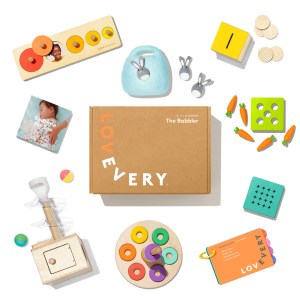We asked 4 professionals what they wished toddler parents would do more—their answers are here

We asked some of our favourite early childhood, Montessori, and resilience experts to share tips and advice with us. Here are their top ten:
Offer limited choices
Give them the choice between two options as often as possible: “we are going out to eat dinner with our friends. You can decide if you want to go into the car feet first or arms first.” This kind of choice may seem inconsequential to us, but it can be really empowering to a child.
Be truly present

Find times when you can be truly present, with your phone unreachable and no other distractions. You are the most important part of your child’s world, and they learn the most through face-to-face interactions. Montessori talks about “being with,” which means being present in body, mind, and spirit.
Make an effort to use big words
You don’t always have to use the simplest language with your toddler. In context, they have just as much capacity to understand the meaning of a more sophisticated word as a simple one.
Follow their lead
Follow your toddler’s lead and observe what they grab, touch, look at, and respond to. Then engage with those experiences or objects. This sounds simple, but it requires keen attention.
Change “sharing” to “turn-taking”
One-year-olds are not mature enough to be ready to share. This is because they don’t yet have “theory of mind,” which means they cannot understand that another person has a different perspective than their own. We can use the term “taking turns” to help begin the conversation that a toy can be enjoyed and then given back.
Slow down
Find times when you can slow way down. Walk at your child’s pace; get down and watch the ants with them; stare at the page until they want to turn it; let them climb the stairs as slowly as they want to.
Give them space to learn
Let your toddler figure things out on their own while you point out their success. We get used to doing everything for our babies, but as they grow we must allow them the space, time, and opportunity to try things like opening drawers, taking off their socks, and washing and drying their hands. None of this will be perfect right away, but the learning is in the doing.
Give them words for their feelings.
What your toddler needs most is for you to explain what’s happening, reflect their experience, and—most importantly—articulate their feelings with words. “You feel mad because I said we have to leave the beach. You’re having so much fun, you don’t want to leave”. Or, “you fell down and that surprised you. It hurt for a minute, but now you’re feeling better”. Use words beyond happy /sad/angry like frustrated, excited, disappointed, worried, and silly. You can read more about toddler emotions here.
Get dirty

Let them get messy and walk around barefoot, both inside and outside. Your toddler is a little scientist, using their entire body to do research; getting messy is one of the best ways they can explore all the physical and sensory parts of their environment.
Give them simple tasks to try

Give your toddler simple tasks to try. Around the age of one year, children can start following one-step and then two-step commands. At first, you can give your child a task and participate with them. For instance, you can say: “let’s put your clothes in the hamper” and let your child drop them in. Or, “time to find your shoes, let’s go see where they are!”. With practice, they can start to do these things on their own (around 15 months). This encourages language processing, independence, and many proud moments.
Thank you to the following experts whose advice we’ve shared:
- Sarah Piel, Infant and Early Childhood Developmental Specialist
- Gabrielle Felman, Early Childhood Special Education Teacher
- Jody Malterre, Montessori Expert and Certified Positive Discipline Trainer
- Dr. Zelana Montminy, Positive Psychologist and Author

The Play Kits
The Play Kits by Lovevery are thoroughly tested, baby safe, eco-friendly and Montessori inspired. Give your child the best start with our stage-based play toy subscription boxes.
Learn morePosted in: 19 - 21 Months, Montessori, Resilience, Social Emotional, Child Development
Keep reading

19 - 21 Months
22 - 24 Months
25 - 27 Months
28 - 30 Months
31 - 33 Months
34 - 36 Months
What kind of chores are right for my child?
Children as young as 18 months can start taking on regular household responsibilities. These will be simple and straightforward, like wiping up spills or helping set the table, and will require modeling and patience from you.


19 - 21 Months
Welcome to The Realist Play Kit for months 19-21
Watch Lovevery CEO Jessica Rolph introduce the Realist Play Kit for months 19 to 11 of your toddler's life.


19 - 21 Months
Introducing the Montessori Animal Match game to your toddler
Lovevery CEO Jessica Rolph and Montessori Expert Jody Malterre demonstrate how the Montessori Animal Match game helps toddlers link 2D images with 3D figurines.
